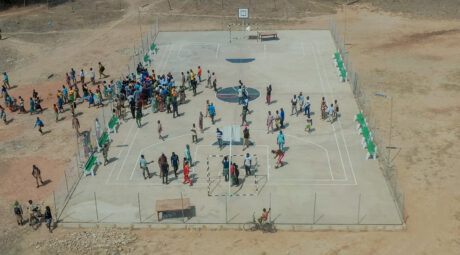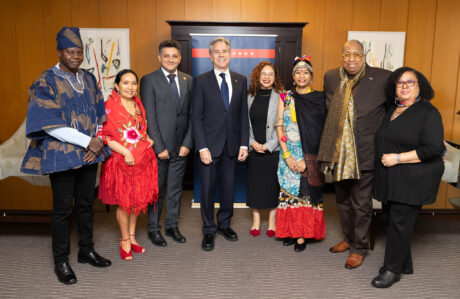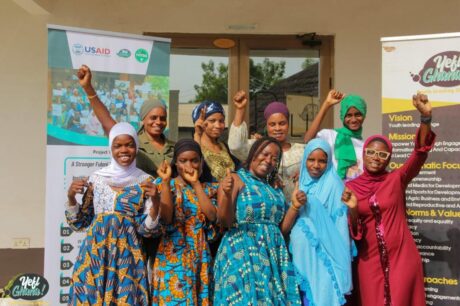Acra, GhanaEn África occidental, Muchas comunidades han sido tomadas por sorpresa por la propagación del extremismo violento.. A lo largo de la frontera norte de Benin con Níger, Los funcionarios locales se sintieron casi paralizados después de una serie de eventos en abril. 2022.
Una carta amenazadora dejada en una mezquita de Karimama advertía que los extremistas atacarían a menos que los residentes les permitieran reclutar a sus jóvenes.. En lo que parecía estar relacionado con la carta, un grupo extremista atacado en abril 26, 2022, la comisaría de policía de monsey, prenderle fuego y matar a un oficial. Los residentes temían que grupos extremistas violentos se hubieran infiltrado en su comunidad y estuvieran planeando nuevos ataques..
“Vivíamos con miedo y no sabíamos qué decirle a las comunidades que estaban aterrorizadas., especialmente después del ataque a la comisaría," dice Amadou Bonkanon, Segundo teniente de alcalde de la comuna de Karimama.
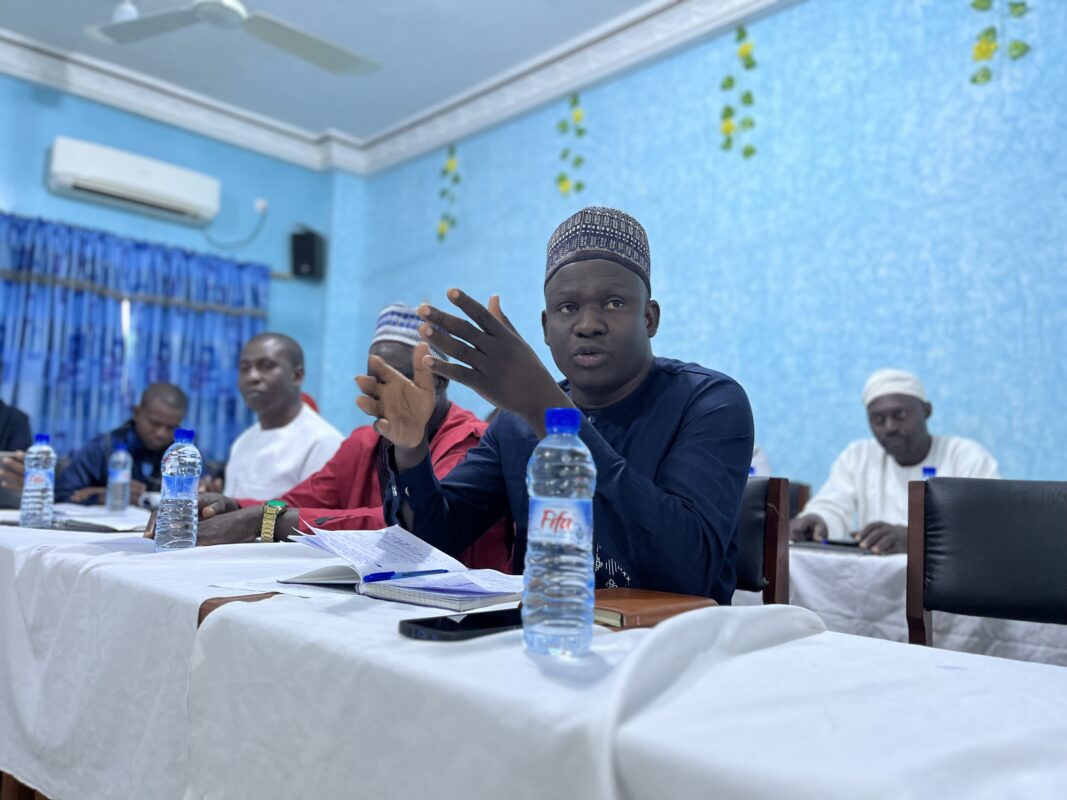
Las comunidades se sintieron solas frente al extremismo
La inseguridad había ido aumentando en el norte de Benin desde finales 2021. La situación se agravó en 2022 con ataques fatales a soldados, un puesto de aduanas y un puesto de policía en el departamento de Alibori, en el norte de Benin, que incluye la comuna de Karimama. con miedo, Varios cientos de personas huyeron de la comuna y se refugiaron en las zonas vecinas..
Comunitarios expresaron preocupación por la falta de respuesta de las autoridades gubernamentales. Los funcionarios nacionales no enviaron ningún mensaje de seguridad sobre los esfuerzos que se están realizando para garantizar la seguridad de las comunidades., ni ninguna orientación sobre cómo reaccionar en tales situaciones.. Los funcionarios locales carecían de las habilidades para establecer enlaces con funcionarios nacionales y agencias internacionales para obtener apoyo adicional.. Los ciudadanos se sintieron vulnerables y marginados, Un clima que debilita la cohesión social y la confianza en las instituciones..
Además, Las autoridades locales admitieron que no estaban preparadas para practicar una comunicación eficaz en tiempos de crisis.. Por ejemplo, Las autoridades locales compartieron información confidencial sobre la violencia extremista con todo el personal del ayuntamiento., no darse cuenta los puso en riesgo. Similarmente, Los funcionarios locales pidieron a los líderes de las mezquitas que hicieran declaraciones públicas contra el extremismo sin considerar que esto podría representar peligros para los líderes religiosos..
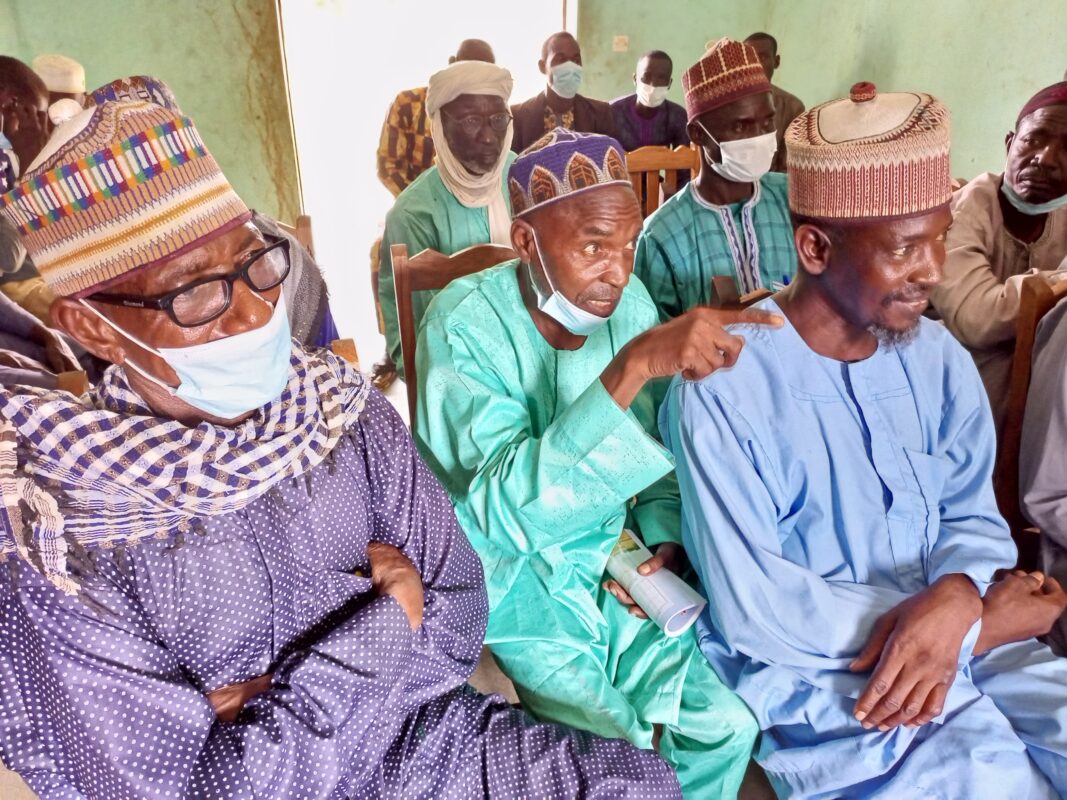
"Antes, durante los sermones y oraciones del viernes, Hemos pedido públicamente a los imanes que oren por la comuna., Ora para protegernos contra los grupos extremistas violentos., sin saber que era peligroso,“dice Medawa Oumarou, Primer teniente de alcalde de la comuna de Karimama.
Los funcionarios locales pasaron por alto la posibilidad de que pudiera haber extremistas presentes entre las congregaciones que podrían identificar a los líderes de las mezquitas como objetivos si hablaban en contra del extremismo.. “Nos faltó comprensión sobre cómo denunciar discretamente incidentes o sospechas sin correr el riesgo de sufrir represalias.,Oumarou dijo.
Un cambio radical en la seguridad local
En un cambio inspirador, Los funcionarios locales pudieron recuperar un sentido de agencia en medio del avance del extremismo violento gracias en parte a la capacitación y el apoyo de la Iniciativa Regional Litoral financiada por la Oficina de Iniciativas de Transición de USAID. (HECHO) que generó resultados este año.
En línea con su estrategia para empoderar a los líderes locales en la prevención del extremismo violento, La Iniciativa Regional Litoral de USAID/OTI se centró en mejorar las habilidades de comunicación de crisis de los funcionarios locales.
En asociación con el Organización para el Desarrollo Sostenible, el Fortalecimiento y Autopromoción de las Estructuras Comunitarias (Organización para el Desarrollo Sostenible, Fortalecimiento y Autopromoción de Estructuras Comunitarias), una ONG beninesa que promueve la justicia social y empodera a las comunidades desfavorecidas, organizó una capacitación integral de dos días sobre prevención del extremismo violento y comunicación sensible a los conflictos personalizada para 25 Líderes religiosos y comunitarios y cinco funcionarios de la alcaldía de Karimama en el departamento norteño de Alibori, incluido el alcalde de Karimama, Soule Sambo Issifou, en mayo. 2022. Subrayando la importancia de una comunicación efectiva con la población después de los ataques, La capacitación equipó a los líderes para comprender y comunicar eficazmente sobre el extremismo violento., Calmar los miedos y reducir los sentimientos de abandono de las comunidades..
Rodilla Abdoulaye, Jefe de distrito de Monsey, fue secuestrado por extremistas durante el ataque a la comisaría de Monsey.
“Yo estaba con mi familia en casa cuando pasó,” Guiwa recuerda. “Todos en la casa estaban asustados.. La gente lloraba y pensaba que todo había terminado para mí.. Me llevaron muy adentro del monte, y por días estuve retenido con otras personas que fueron secuestradas, también."
Guiwa logró escapar cuando los secuestradores no estaban prestando atención.. Ahora cree que su falta de comprensión de la comunicación de crisis fue parte de la razón por la que fue secuestrado..
"En ese tiempo, No entendíamos que nuestra forma de comunicarnos nos estaba exponiendo.,La rodilla dice. “Compartimos información sensible en público y colaboramos con las fuerzas de seguridad a la vista de todos.. Este podría ser el motivo de mi secuestro”.
Reflexionando sobre la formación., Guiwa dice que sus acciones han cambiado.
“Con esta formación, Sinceramente comprendí cuánto me ponía en peligro en varias ocasiones.. Ahora sé comunicar o denunciar sin ponerme en peligro.,—añade Giwa.. “Ahora sabemos cómo informar a la jerarquía sin ponernos en peligro y garantizar la autenticidad de la información o verificarla antes de comunicarla”.

Ismail Badou Soffo, Líder comunitario y residente de la aldea de Djindjiré-Béri en la comuna de Tanguieta., dice que la comunicación de crisis no estuvo coordinada en el pasado.
"Inicialmente, No recibimos ninguna comunicación formal ni orientación sobre cómo actuar cuando hay una amenaza o incluso cuando hay un ataque., Así que cada uno de nosotros hizo lo que pensó que era mejor.,” dice Soffo. “Ahora manejo los rumores de otra manera. cuando escucho uno, no lo difundo, y le pido a la persona que lo compartió que deje de difundirlo más. Entonces, busco la fuente, y tratar de verificar la veracidad, y luego decidir el curso de acción apropiado”.
El programa de capacitación proporcionó a los líderes religiosos enfoques de comunicación que pueden utilizar de manera segura durante los sermones del viernes para contrarrestar el extremismo violento y promover la tolerancia étnica y la cohesión social.. despues del programa, Los imanes transmitieron mensajes de tolerancia y convivencia durante los servicios religiosos y alentaron a los residentes a mantener la calma y la cautela., dada la situación del municipio tras el atentado de Monsey.
“Debemos educar a todos los que llaman a la oración para que bajen la voz y eviten el uso de micrófonos durante el llamado a la oración.," dice Garba Aoudou, un líder religioso de Karimama. “Aconsejo a todos los participantes que eviten estrictamente hablar de organizaciones extremistas violentas durante las reuniones públicas., ya que no conocemos a todos los presentes”.
Para comenzar a reparar la pérdida de confianza, La Iniciativa Regional de Litorales y DEDRAS también organizaron dos días de diálogo en junio. 2022 involucrando a líderes comunitarios, autoridades del gobierno local, y miembros de la comunidad de Karimama. Los participantes compartieron sus puntos de vista sobre el atentado de Monsey, renovar la confianza entre los residentes y las autoridades y fomentar la buena voluntad dentro de la comunidad.
Compartir estrategia con otras comunidades
Las discusiones durante las intervenciones resaltaron la necesidad de una estrategia proactiva para preparar a las comunidades en riesgo antes de que ocurran ataques extremistas violentos.. La Iniciativa Regional Litoral de USAID/OTI reconoció que crear conciencia entre los funcionarios electos de áreas menos afectadas alentaría la acción para prevenir el extremismo violento y al mismo tiempo difundir enfoques de comunicación efectivos..
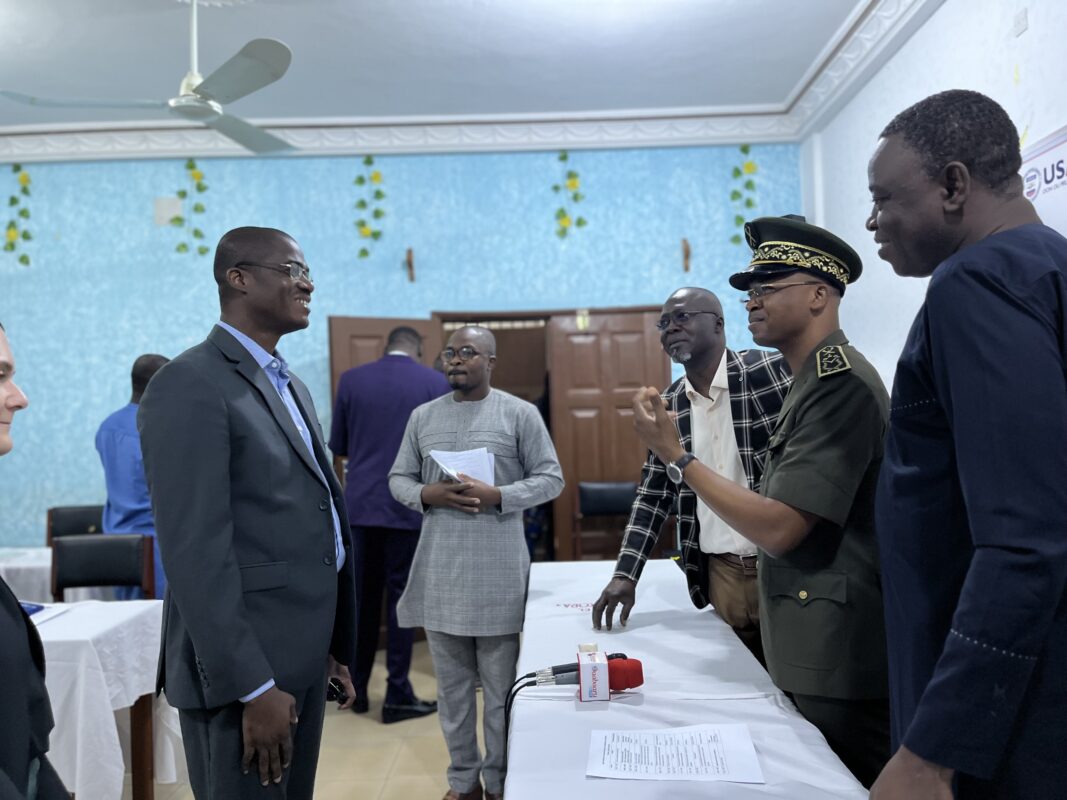
Cerrando la brecha de comunicación entre las autoridades locales y los electores, El alcalde de Karimama, Issifou, expresa su firme apoyo a ampliar la formación a alcaldes y autoridades de otros municipios. Issifou también destaca el valor de que los funcionarios locales se reúnan con sus pares de otros ayuntamientos para mejorar la comunicación durante las crisis de seguridad..
Apoyar el intercambio de conocimientos con otros funcionarios locales de toda la región., La Iniciativa Regional Litoral de USAID/OTI y DEDRAS brindaron capacitación de actualización sobre comunicación sensible a conflictos y prevención del extremismo violento en mayo. 2023 para los alcaldes Issifou y Kassa, así como para sus cuatro tenientes de alcalde. A continuación, los socios apoyaron a los alcaldes de Karimama y Materi en la organización de una gira de intercambio de experiencias visitando los ayuntamientos de 25 comunas en los departamentos de Atacora, donga, Borgou y Alibori de mayo a julio 2023.
durante el recorrido, El alcalde de Karimama, Issifou, y el alcalde de Materi, Wimbo, Robert Kassa, compartieron lecciones aprendidas y estrategias de comunicación sensibles a los conflictos con sus homólogos de otras comunas.. Los alcaldes Issifou y Kassa aprovecharon la oportunidad para abogar por la formación de una coalición regional de alcaldes del norte para solicitar el apoyo de funcionarios nacionales e internacionales en la lucha contra el extremismo violento..
Para compartir experiencias del recorrido., La Iniciativa Regional de Litorales de USAID/OTI y DEDRAS organizaron una conferencia sobre paz y cohesión social en agosto 2023, reuniendo a alcaldes de los cuatro departamentos del norte de Benin. En la conferencia de Parakou, 32 Los participantes discutieron cómo abordar las causas de la inseguridad., como mejoras en la infraestructura, empleo juvenil, e inteligencia. La conferencia mejoró la coordinación y comunicación entre los alcaldes, ya que acordaron los temas que presionarían durante las visitas de promoción en 2024.
Abogar por poner fin al extremismo violento
Los socios apoyaron a las delegaciones de alcaldes en sus visitas de promoción en enero y febrero. 2024 con autoridades nacionales de cinco ministerios y cuatro comisiones y agencias y representantes internacionales de tres embajadas.
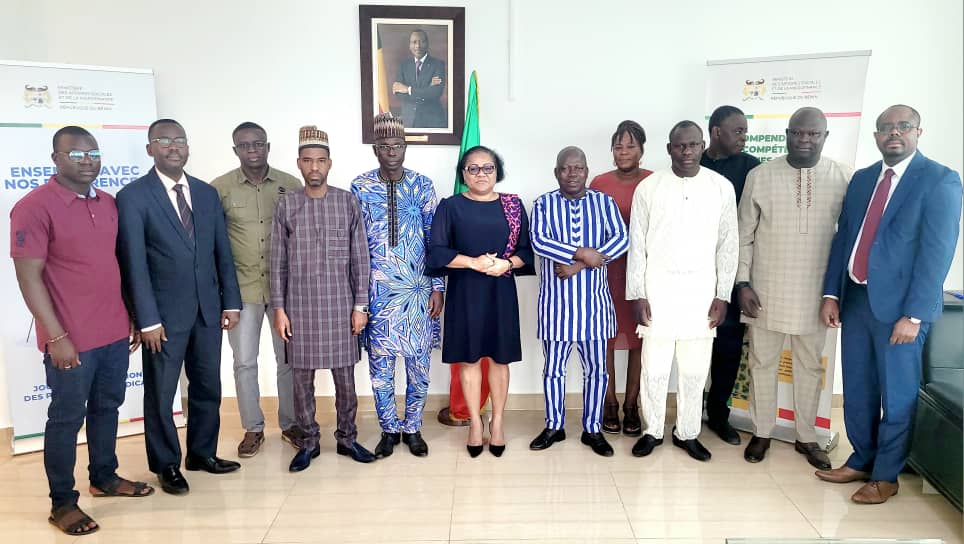
A finales de enero 2024, un grupo de seis alcaldes del norte de Benin y personal de DEDRAS realizaron visitas de promoción a numerosos ministerios e instituciones nacionales. Los alcaldes contaron a funcionarios nacionales los ataques que habían sufrido sus comunidades, incluyendo secuestros, asesinatos selectivos y robo de ganado.
Los alcaldes informaron a funcionarios nacionales sobre las nocivas consecuencias de la violencia, incluidas las tensiones entre comunidades, crisis económicas, Cierre de escuelas primarias y desplazamiento de residentes.. Los alcaldes pidieron a los funcionarios nacionales apoyar fomentando el empleo juvenil, proporcionando planes de seguridad locales, aliviar los toques de queda, mejorar la seguridad de los funcionarios comunales, Asegurar las carreteras entre municipios y reforzar las fuerzas de defensa y seguridad.. Los funcionarios nacionales prometieron abordar las preocupaciones de los funcionarios locales..
en febrero 2024, Los alcaldes realizaron una visita de promoción de alto nivel a funcionarios benineses, incluidas las comisiones nacionales sobre refugiados., Extremismo violento y pastoreo., el Ministerio de Desarrollo y Coordinación de la Acción Gubernamental y el Ministerio del Interior y Seguridad Pública, así como con los EE.UU.. Embajador en Benin y funcionarios internacionales de Expertise France y de la Embajada de los Países Bajos. Los alcaldes resaltaron los peligros que enfrentan sus comunidades y abogaron por acciones para fortalecer la seguridad y la cohesión social. Los funcionarios expresaron su compromiso de atender las inquietudes de los alcaldes.
La promoción de los funcionarios locales genera resultados
Los esfuerzos de promoción condujeron a mejoras claras en infraestructura y comunicación.. El Ministerio del Interior y Seguridad Pública inició un proyecto para establecer 35 ventanilla única de protección social, y el municipio de Materi agilizó la instalación de su centro. Los alcaldes expresaron su agradecimiento, observando una mejor coordinación y comunicación con las autoridades departamentales y nacionales, y reconocieron el impacto positivo en sus comunidades. El alcalde de Karimama, Isssifou, dijo que las visitas llevaron a las autoridades nacionales a acelerar la construcción de la vital carretera Guéné-Karimama..
Los alcaldes dijeron que los contactos han mejorado la comunicación con los ministerios nacionales sobre cuestiones críticas de seguridad y posibles soluciones y que las instituciones nacionales son más receptivas a la información de los funcionarios locales.. Los funcionarios locales dijeron que ahora comprenden mejor la estrategia nacional para prevenir el extremismo violento y los planes de seguridad locales., y confían en que mantendrán una buena comunicación en el futuro.
